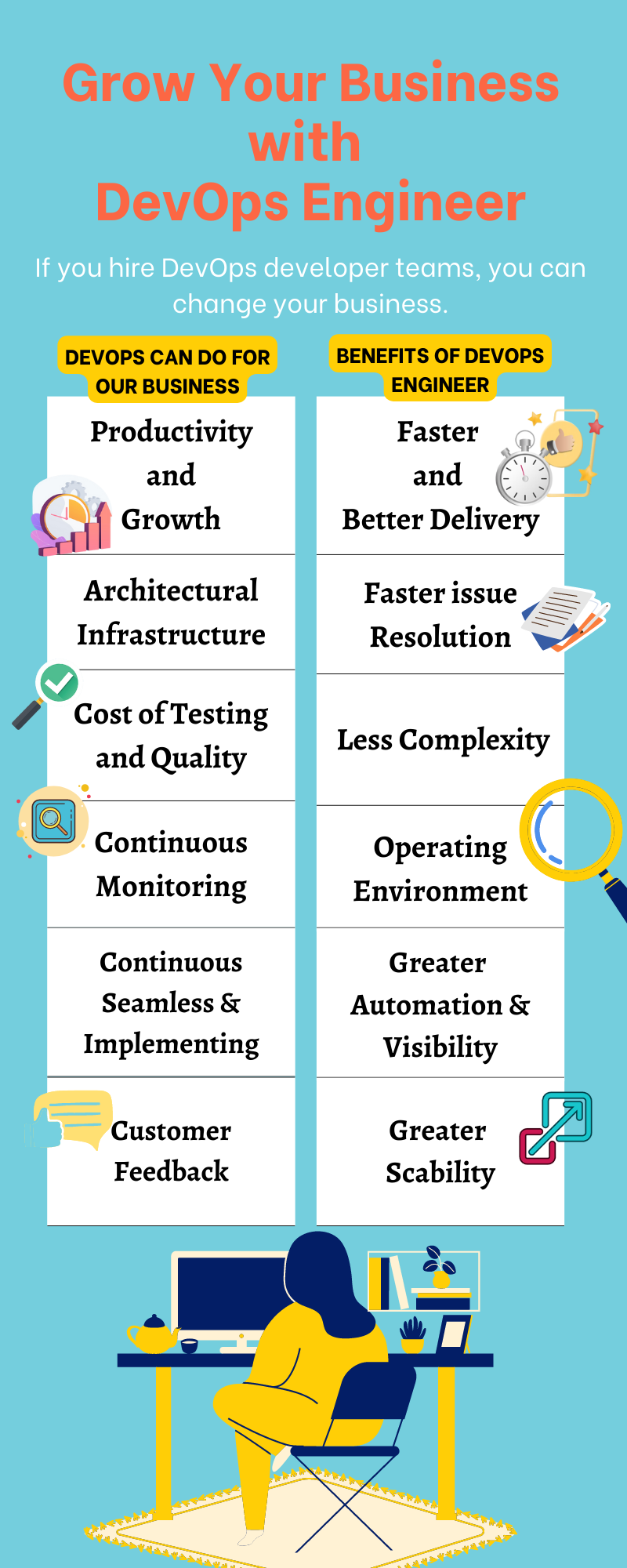Do you want to hire DevOps engineer staff for your business? Many people confuse DevOps with a tool or even an entire team, but it’s really a process. Companies hire DevOps engineers to facilitate and improve the communication and collaboration between the development and Operations teams.
Think about it this way. Businesses are constantly evolving and competing with one another. If you don’t move fast enough, you can lose your entire business. You need exceptional performance and robust automated development and deployment methods to stay in sync with those market trends.
DevOps enable speed and quality so that deliverables reach customers within a reasonable time frame. That’s why so many businesses consider DevOps as a key component in software development. DevOps will bridge the gap between speed, efficiency, and quality so that you can compete and become more successful in your business. When you hire DevOps developer teams, you can change your business.
DevOps Methods
There are several DevOps methods your company can use, but the most popular are Scrum, Kanban, and Agile.
Scrum defines how members of a team should work together to accelerate development and Quality Assurance. This includes implementing key workflows and using specific terminology, like sprints and daily scrum meetings. Roles are assigned, e.g., product owners and Scrum Masters.
Read: What does DevOps actually do
Kanban comes from the famous Toyota factory and refers to the state of project work in progress tracked on a Kanban board.
Agile development uses shorter software development lifecycles to release products incrementally instead of longer Waterfall development methods. Kanban and Scrum may also use elements of agile development.
How you can help your teams when you hire DevOps engineer teams
When you hire DevOps developer teams, many other teams in the organization benefit as well. For example, if DevOps extends the scope of data warehouses from historical data to real-time data, they will combine the transaction-level data to include system and Web performance data.
Functional engineering teams no longer have to log files in a text editor to identify errors. Through DevOps, they can build a more intelligent framework and reporting mechanism and dashboards with insight into the entire infrastructure.
Read: A Guide To DevOps and Software Architecture
Product managers and others who are responsible for revenue levels of specific products no longer have to wait days for analysis to reveal the business impact of a new user interface or pricing mechanism. That way, they can achieve near-real-time visibility into results and make changes to reach revenue goals.
Here is what DevOps can do for your business:
-
DevOps will help your team explore potential avenues of productivity and growth in the business. They can help your organization identify key skill sets and resources and focus on the seamless flow of the value stream to make it more customer-centric.
-
When you hire DevOps, they will help you draft a development plan and focus on architectural infrastructure. They will consider the working process, the apps you’ll need, and the overall business strategy.
-
DevOps will encourage continuous testing to support developers in effectively balancing speed and quality. By using automated tools, you can decrease the cost of testing and enable QA experts to invest their time more productively.
-
Continuous monitoring will maintain the quality of the process and address flaws and errors the moment they occur, which helps keep an eye on the user experience and improve the stability of their applications.
-
Continuous release and deployment will help in implementing code reviews and check-ins seamlessly, depreciating manual tasks and providing a single view across all applications.
-
Customer feedback will help enhance the quality and decrease the cost of the entire process throughout the software lifecycle.
The Benefits of Leveraging DevOps
When you hire DevOps engineer teams, you will access many exciting benefits:
Read: Best Practices & Tools for DevOps Testing Strategy
-
Faster and better delivery of your end products
-
Faster issue resolution
-
Less complexity
-
Greater scalability and availability
-
More stability in your operating environments
-
Better utilization and optimization of your resources
-
Greater automation and visibility
-
More innovation in your company
Here’s how it will work. DevOps relies on principles like automation, continuous delivery, and rapid feedback to create a nimble, dynamic and productive software development life cycle. DevOps is an extension of the Agile Methodology, so automation is used to ensure that software is seamlessly developed and that applications are promptly executed with fast incremental releases.
Read: Roadmap To DevOps Developer
There will also be fewer deployment errors to contend with. You can use DevOps to execute a bulky level of code in a short period. Teams are organized in a way that makes it easier to share their feedback. Errors are recognized early, so they can be solved early. This results in shorter and more robust development cycles…so your product gets to market faster, making your business more competitive.
DevOps can also enhance communication and collaboration among your teams, which is great for your company culture and productivity. Teams combine and work together to innovate and improve agility.
DevOps creates this environment of mutual communication, collaboration, and integration across globally distributed teams in an organization. Employees feel more comfortable, gain new insights and become more productive together.
This can also create internal ambassadors for your company and improve recruitment and hiring because your teams will feel more positive.
DevOps is a continuous process, so it’s fast but relatively error-free. The way the development, testing, and operational phases are structured will enhance your productivity and business growth, and cloud-based models will enhance testing, making it more robust and scalable.
DevOps is very popular in the business world because it provides the agility and continuous delivery, and support that businesses need for digital transformation and competitiveness.
Read: Salesforce DevOps
There is also the addition of SecOps, the collaboration between Security and Operations teams offering the best security practices for companies to follow, as well as the best practice process to adhere to. Companies can supervise security threats, manage incidents, and decrease risks through SecOps.
Conclusion
The addition of a DevOps methodology can accelerate growth in your business and enhance everything you do. When you decide to hire DevOps engineer teams, your entire company will become more agile, focused, and robust.


